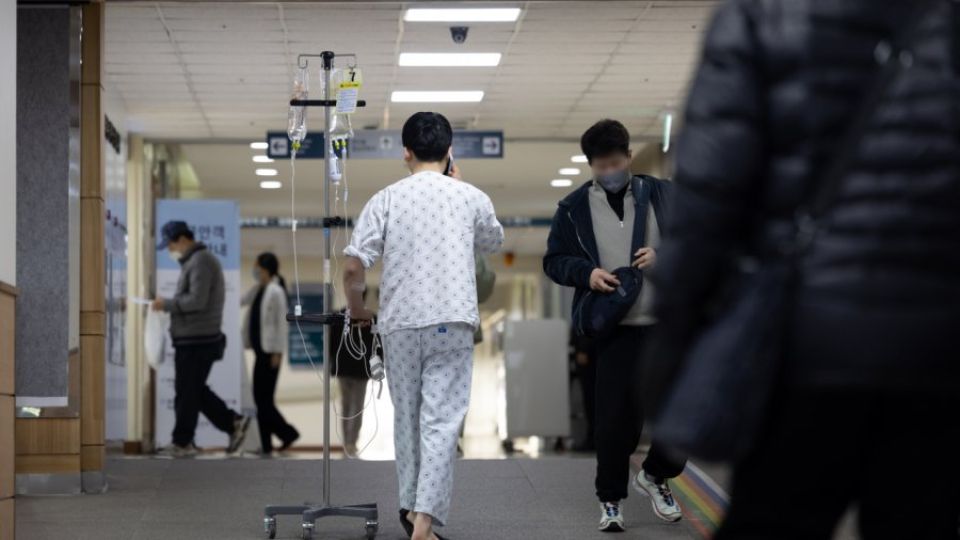March 15, 2024
SEOUL – Oh Myung-jin, 44, who has to care for two critically ill family members, blew a fuse after hearing the news of medical professors considering leaving their hospitals too, joining junior doctors in their protest against the government increasing the medical school student quota.
“If professors also walk out, (patients) won’t be able to get the same treatment starting this month or even next week. (My daughter and father) including myself are living in constant fear,” she told The Korea Herald.
Her middle school daughter has been battling spinal arteriovenous malformation, which is an abnormal tangle of blood vessels on, in or near the spinal cord, for a year now at Seoul National University Hospital. Without treatment, the rare condition can permanently damage the spinal cord, cause trouble walking and lead to lower extremity weakness. Oh’s 70-something father has stage 4 prostate cancer, and is also being treated at SNUH. Her father needs continued radiation therapy and chemotherapy.
“Patients and their families have all got to take this hit. I’m grateful for the help that my daughter and father have gotten, but doctors shouldn’t pressure the government by exploiting patients’ health to block the expansion of medical schools,” Oh said.
“Holding people’s lives hostage is going against the Hippocratic oath, which emphasizes to act in patients’ interests,” she added.
Oh is one of those patients, and her family fears a potential medical void due to the ongoing battle between the government and doctors, which has been affecting the nation’s health system for nearly a month
Earlier this week, medical professors, who have been filling the vacuum left by trainee doctors, warned they, too, could stop taking in patients and perform operations starting next week. Physicians on fellowships in hospitals are reportedly considering the same.
Amid growing tensions, patients have been urging doctors to return by their side.
On Wednesday, an association advocating for patients with severe diseases comprising seven patient groups, including the Korean Cancer Patients Rights Council, issued a statement saying that doctors leaving the medical field is like a “death sentence handed to patients.”
Yoon, a chronic patient in his 80s being treated at SNUH, who wished to be identified only by his surname, told The Korea Herald that he felt he would “die anytime soon” amid doctors’ departure.
“As people age, especially those my age, hospital visits become more frequent. I was recently hospitalized because of esophagus problems, and my weight fell to nearly 46 kilograms. That’s more than 10 kilograms off my original weight,” Yoon said.
“I’m barely holding on to life. But without doctors, it would be a very worrying situation for me, as well as my family. Doctors have to play their part, and that is to stay beside patients, so please do,” he added.
A 50-something patient who experienced heart failure surnamed Park, who’s been getting medical treatment at Asan Medical Center for 10 years now, likened doctors’ resignations to “falling off a cliff.”
“I think their absence showed how pivotal they are to patients and their recovery. But if doctors leave, it’s like pushing patients from a cliff and telling them to survive by themselves without giving any help or advice. They should know their choices could negatively impact people’s lives, especially patients in dire need of help,” he said.
Without a breakthrough any time soon, Lee Jun, a 32-year-old corporate worker and a guardian of a cancer patient, is also in a fury.
“As someone with a family member who is struggling to arrange surgery for cancer at any of the major hospitals, the resignations of senior medical professors is making me very anxious,” he told The Korea Herald.
His mother’s surgery was initially set for this month at Samsung Medical Center, but has been postponed indefinitely.
“I don’t understand how doctors, especially senior doctors, could justify walking out on patients who need lifesaving treatment sooner rather than later,” Lee said. “It’s obvious that doctors are striking to try and reverse a policy that they think threatens their interests.”
Some patients support the doctors’ decision to protest against the government, saying it is their choice to make, and does not indicate they care less about patients.
A 20-something hypertrophic cardiomyopathy patient, an illness where the heart muscle becomes thickened, openly expressed support for doctors on social media after her attending physician announced his intention to resign.
“It’s heartbreaking to see how those who haven’t experienced what doctors are going through are criticizing them. I don’t understand how a doctor who saved my life is being demonized,” the post read.
Meanwhile, a total of 11,994 trainee doctors at 100 training hospitals had not reported for their duties as of March 8, according to the Health Ministry.
In addition, more than 1,230 cases have been filed to the ministry’s reporting and support for patients affected by doctors’ collective action as of Tuesday at 6 p.m.
The public’s support of the protesting doctors has been unfavorable so far. In a survey of 1,016 people conducted by the Korean Health and Medical Workers’ Union in December last year, some 85.6 percent were against doctors refusing to see patients or going on strike.


